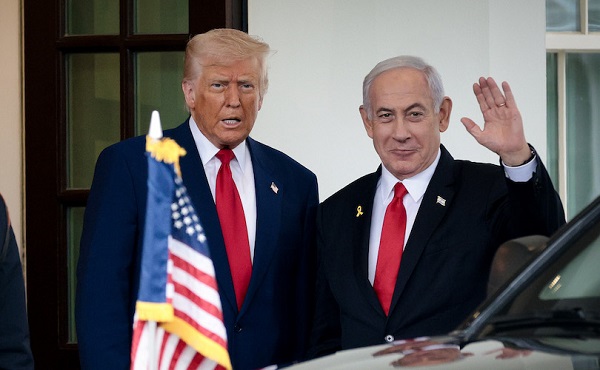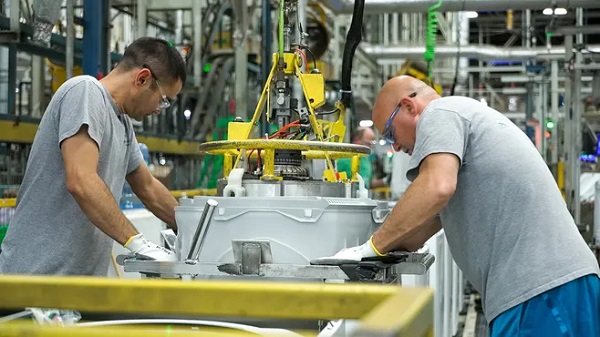International
Israeli media report claims Netanyahu and Trump agreed to end Gaza hostilities

From LifeSiteNews
The apparent deal allows for Gazans to emigrate to unnamed countries, the release of Israeli hostages, the exiling of Hamas leaders, and governance of the Strip by Egypt and the UAE.
A report issued in the Israeli media claims that President Donald Trump and Prime Minister Benjamin Netanyahu agreed to bring the hostilities in Gaza to a rapid end and expand the Abraham accords.
Israel Hayom reported on Thursday that in a phone call directly following the U.S. military bombing of Iran on Monday, the two leaders agreed the war in Gaza would conclude within two weeks.
According to the daily newspaper’s sources, the region will then be governed by the UAE and Egypt in place of Hamas, the leaders of which would be exiled. Additionally, Israeli hostages still being held by Palestinian militant groups would gain their freedom.
However, Arab allied nations have maintained that they will not participate in the rehabilitation of Gaza apart from the region being turned over for management to the West Bank’s Palestinian Authority as a preparation for a two-state solution demanded under international law, though Netanyahu flatly rejects considering this option.
Additionally, there is no indication from Hamas leaders that they would accept these apparent terms.
Also joining Trump and Netanyahu on this call, according to the report, were U.S. Secretary of State Marco Rubio and Israeli Strategic Affairs Minister Ron Dermer.
Further terms discussed on the call include the potential transfer of Gaza survivors who wish to escape their current plight and emigrate to other unnamed countries, while the new government of Syria and Saudi Arabia would recognize Israel and establish diplomatic ties with the expectation that other Arab and Muslim countries will then do the same.
For its part, Israel would declare its willingness “for future Palestinian conflict resolution under the ‘two states’ concept, contingent upon the Palestinian Authority reforms.”
Strangely, following the expression of such support, the apparent deal includes a U.S. recognition of “limited Israeli sovereignty implementation in Judea and Samaria (the West Bank),” suggesting the negation of Palestinian sovereignty over its internationally recognized territory, a constituent aspect of statehood.
Consistent with the requirements of international law, Arab nations maintained their willingness to recognize Israel and guarantee its security with the ending of their occupation of internationally recognized Palestinian territory and the allowance of an independent and sovereign Palestinian state to emerge on these lands.
Such a solution is supported by the overwhelming number of national governments of the world and the Catholic Church as witnessed to by the unanimous and constant testimony of the bishops in the region and the Holy See over decades.
Hmmm. pic.twitter.com/IbYrjGCegS
— 🇨🇦 Antonio Tweets (@AntonioTweets2) June 23, 2025
Business
China still squeezing rare-earth exports despite U.S. pact

Quick Hit:
Weeks after agreeing to ease restrictions, China continues to stall rare-earth magnet exports, causing Western manufacturers to scramble for critical components and raising fears that Beijing is weaponizing its supply chain leverage.
Key Details:
- Applications for rare-earth magnet exports are being delayed or denied despite a U.S.-China agreement to resume trade.
- Western firms report that supply remains critically low, with some forced to redesign products or ship components by air to avoid shutdowns.
- China’s approval process demands sensitive commercial data, fueling concerns of industrial espionage and political pressure.
Diving Deeper:
Despite pledging to ease export restrictions on rare-earth magnets in a deal with the United States earlier this month, China continues to strangle the flow of these critical components, leaving Western industries on edge and trade tensions simmering.
Western companies say the situation has barely improved since China’s Ministry of Commerce promised to accelerate export license approvals. In practice, approvals remain rare, applications take weeks to process, and many are outright rejected. The bottleneck is hitting manufacturers hard—particularly automakers and electronics producers—who rely on China’s near-monopoly of the world’s most powerful rare-earth magnets.
“It’s hand to mouth—the normal supply-chain scrambling that you have to do,” said Lisa Drake, Ford’s VP of industrial planning for EVs. Though she acknowledged some improvement, she made clear the shortages are forcing operational gymnastics to avoid production halts.
The restrictions stem from export controls Beijing implemented in April, shortly after President Donald Trump imposed heavy tariffs on Chinese goods. While China claimed the license system was meant to regulate military-use exports, the real-world effect has been a sharp drop in rare-earth magnet shipments to the U.S.—down 93% in May compared to last year.
Although the White House announced that China had agreed to resume exports in exchange for reduced U.S. restrictions on certain American goods, the ground reality tells a different story. Export licenses are now limited to six months, and applicants must submit highly sensitive commercial details—such as magnet integration designs and buyer contacts—raising red flags for many Western firms. When companies decline to provide such data, licenses are often denied or stalled for 45 days or more.
“Yes, the export restrictions have been paused on paper. However, ground reality is completely different,” said Neha Mukherjee of Benchmark Mineral Intelligence, citing chronic bureaucratic delays.
Chinese officials claim they’ve approved “a certain number” of licenses, but industry insiders say approvals favor large, state-backed magnet companies. Smaller Chinese producers are suffering under the export squeeze and some are trying to collaborate with foreign buyers to bypass restrictions—such as promoting less-powerful magnets not subject to the controls.
However, these substitutes are often inadequate for high-performance applications like automotive motors, AI servers, and defense systems. Some manufacturers have begun redesigning their products, while others are resorting to expensive airfreight to keep assembly lines alive. As one U.S. importer put it, “These are the things you don’t hear about, how much money it is taking to keep these factories running, you know, limping along.”
Meanwhile, Europe is growing more vocal. Germany’s top industry association recently called on its government to challenge Beijing’s tactics, warning that “licensing procedures must not be used as a means of exerting political pressure.”
All signs point to a calculated effort by Beijing to maintain leverage over the West—despite public commitments to ease trade. With China controlling 90% of global supply for these crucial materials, the U.S. and its allies are now forced to confront a familiar truth: when it comes to rare earths, China holds the cards, and it’s not afraid to play them.
Business
TRUMP TARIFFS: GE Appliances brings washer manufacturing back from China

Quick Hit:
GE Appliances is reshoring its washer manufacturing operation from China to Louisville, Kentucky in a $490 million move expected to create at least 800 new jobs.
Key Details:
- The company will relocate production of more than 15 washer models to its sprawling Appliance Park campus in Louisville, where it already builds top-load washers and dryers.
- GE Appliances expects to hire at least 800 full-time employees as part of the expansion, which will add the equivalent of 33 football fields of production space.
- CEO Kevin Nolan said the move aligns with the “current economic and policy environment” and reflects a broader strategy to “make appliances as close as possible to our customers.”
Diving Deeper:
GE Appliances announced Thursday it will move most of its washer production out of China and bring it home to the U.S., investing nearly half a billion dollars in expanding its Appliance Park operations in Louisville, Kentucky. The strategic reshoring decision comes as U.S. policy increasingly favors domestic manufacturing and as companies respond to shifting global supply chain realities.
“With this investment, we are bringing laundry production to our global headquarters in Louisville because manufacturing in the U.S. is fundamental to our ‘zero-distance’ business strategy,” said GE Appliances President and CEO Kevin Nolan. “This decision is our most recent product reshoring and aligns with the current economic and policy environment.”
The $490 million investment will focus on Building 2 at Appliance Park, where more than 15 new washer models will be assembled, significantly boosting the company’s clothes care footprint. The added capacity brings GE’s total laundry production space at the Kentucky facility to the size of 33 football fields.
“This move puts our production closer to our designers, engineers and consumers so we can build our most innovative laundry platforms right here in the U.S.,” said Lee Lagomarcino, vice president of clothes care at GE Appliances.
Kentucky Governor Andy Beshear applauded the decision, calling it a major boost for the state’s manufacturing base. “This investment strengthens one of our vital Kentucky assets and underscores our state’s reputation as America’s destination of choice for advanced manufacturing and job creation,” Beshear said.
The reshoring announcement follows a broader trend under President Donald Trump’s economic agenda, which includes imposing tariffs to incentivize companies to relocate production back to American soil.
Appliance Park currently employs roughly 8,000 workers and has been the centerpiece of the company’s U.S. operations. Over the last 10 years, GE Appliances has invested $3.5 billion into domestic manufacturing, with facilities in multiple states. The company says the washer production shift to Kentucky will be completed by 2027.
-

 COVID-192 days ago
COVID-192 days agoOntario man launches new challenge against province’s latest attempt to ban free expression on roadside billboards
-

 COVID-192 days ago
COVID-192 days agoNew Peer-Reviewed Study Affirms COVID Vaccines Reduce Fertility
-

 Alberta2 days ago
Alberta2 days agoAlberta Next Takes A Look At Alberta Provincial Police Force
-

 Energy2 days ago
Energy2 days agoThis Canada Day, Celebrate Energy Renewal
-

 Business2 days ago
Business2 days agoFederal government should finally cut Trudeau-era red tape
-

 MAiD1 day ago
MAiD1 day agoCanada’s euthanasia regime is not health care, but a death machine for the unwanted
-

 Alberta2 days ago
Alberta2 days agoCanadian Oil Sands Production Expected to Reach All-time Highs this Year Despite Lower Oil Prices
-

 Alberta1 day ago
Alberta1 day agoAlberta’s government is investing $5 million to help launch the world’s first direct air capture centre at Innisfail






